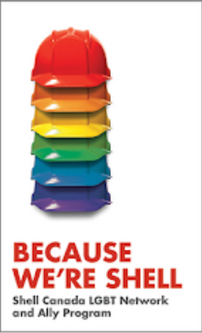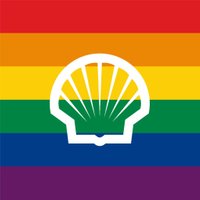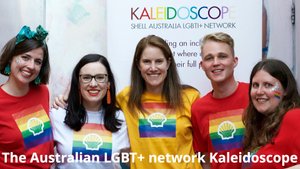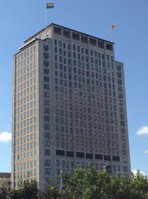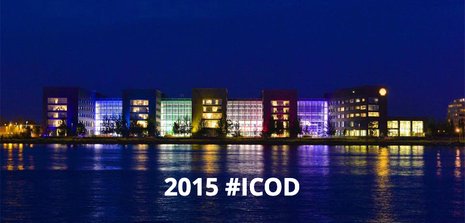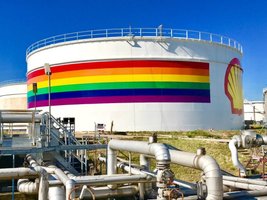© 2021 BRIGHT Marketing Solutions
Marketing the Rainbow
Click on the pictures for a larger version
Introduction
Royal Dutch Shell, commonly known as Shell, is a British–Dutch multinational oil and gas company headquartered in Netherlands and incorporated in United Kingdom. It dates back to 1890. It is one of the oil and gas "supermajors" and the third-largest company in the world measured by 2018 revenues (and the largest based in Europe). Shell was one of the "Seven Sisters" which dominated the global petroleum industry from the mid-1940s to the mid-1970s. Shell operates in 70 countries and employs around 94,000 people.
The corporate website states: "At Shell, we support and enable remarkable people from every background, and strive to be a pioneer of LGBT+ inclusion in the workplace. We care about the diversity of our people because we believe that a fully inclusive workplace allows our employees to flourish and so allows our business to flourish. When our employees excel, we excel. It’s for this reason that we are proud to support our lesbian, gay, bisexual and transgender (LGBT+) staff, promoting equality for employees regardless of sexual orientation or gender identity."
The website gives topical information and perspectives, including the personal (coming out) stories of several LGBT employees.
Shell has been a longstanding 'Leader' of Workplace Pride, who ranked them the 4th most LGBT-inclusive employer in the world. They are a corporate partner of the Human Rights Campaign (HRC), scoring a perfect 100% in the HRC Corporate Equality Index.
LGBT+ Networks at Shell
"Shell LGBT+ Networks have been set up as a supportive space for LGBT+ colleagues to find confidence in being themselves at work. They aim to raise awareness of the challenges that LGBT+ staff face and work with people at all levels of the organisation to ensure Shell is a safe and inclusive workplace.
Amsterdam Pride 2018
During the week of Pride Amsterdam 2018 in the Netherlands, four Shell retail stations in the area proudly wore the rainbow colours. By supporting Pride Amsterdam, Shell wanted to let their staff, partners, customers and the wider community know that they value and celebrate the freedom to be who you are.
Pride 2017
Shell said: "Our employees joined in Pride Parades all around the world this year. From Australia to the United States, learn what it meant to them. Shell LGBT+ Networks have been set up as a supportive space for LGBT+ colleagues to find confidence in being themselves at work. They aim to raise awareness of the challenges that LGBT+ staff face and work with people at all levels of the organisation to ensure Shell is a safe and inclusive workplace."
The first LGBT+ Network was established at Shell in the US in 1996 and was soon followed by networks around the world. Today, we have a truly global LGBT+ network, with local chapters in 13 countries, including in the UK, the Netherlands, Australia, Canada, India, South Africa, the Philippines, Singapore, Brazil, Norway, Poland, and Germany.
The purpose of such networks is to serve as a support system for LGBT+ staff and to connect colleagues – including allies – across the business, raising awareness by breaking down barriers, for example by running learning and support sessions, and participating in local events.
Shell flies the Pride flag outside many offices during Pride weeks and International Coming Out Day.
London HQ
Since 2011, the headoffice in London flies the rainbow flag on top of the building on the occasion of London Pride.
Mark McBride-Wright, founder of UK-based LGBTI engineering network, InterEngineering: ‘It is fantastic to see Shell take a stance to show support for its LGBT employees. Shell have in fact in the past included a story of an LGBT employee on its company intranet, which was viewed by a quarter of its workforce. It is important to recognize they have operations in some dangerous countries for LGBT employees. This sends a strong message of their support.’ He suggests that multinational giants such as Shell have an important role to play in spreading the diversity message to the smaller businesses with whom they work, and to the many countries in the world in which they operate. ‘Within the energy sector, oil and gas firms are advancing ahead for LGBT diversity and inclusion initiatives. Change can be cascaded through the entire supply chain if oil and gas firms were to mandate a requirement for secondary and tertiary suppliers to demonstrate what they are doing on diversity and inclusion.’
Coming Out Day
For a number of years Shell has been giving attention to International Coming Out Day (#ICOD) on their social media, but on one occasion the Dutch HQ was illuminated for the night. A Malaysian government agency even called for a boycott of Shell for this, with no effect.
To my surprise, this display of solidarity was met with great skepticism, and qualified as "pinkwashing". I wrote about Pinkwashing before (and after), but this was definitely not the case for Shell. The campaign did not have a business case, they did not expect to sell 1 liter more (or less, for that matter). The budget of €100,000 was used for visibility, celebration and support. Four gas stations were completely redone, including marquee, billboards, coffee cups and brochures.
But also a large oil container on their refinery site, as well as a zebra-crossing there came to see rainbows. These locations are not accessible, nor visible for customers. This supported the idea that this was NOT Pinkwashing - also because Shell is working hard on Diversity all year round.
Fun fact: some know-it-all tweeted hatefully about Shell "turning the rainbow flag upside down" on the marquee of the stations. However, the designer of the flag, Gilbert Davis, has repeatedly declared that there is no up or down, and that in fact the flag was originally designed to be hung vertically, on the lampposts along the route of San Francisco Pride. A pity that social media makes it so easy to spout negative nonsense.
Note on Pinkwashing
There are voices who claim that companies like Shell, who also face environmental issues, are using their diversity face to cover up such issues - if not directly, then indirectly. They call it pinkwashing. Shell was called out for polluting the Niger delta, and for making the province of Groningen sink due to the pumping up off natural gas. These people said Shell had no right to use the rainbow until these problems were 'solved'.
In my view, pinkwashing only relates to your LGBT+ behavior or treatment. Any other issues are unrelated, and it is undesired, if not impossible, to demand a completely clean slate before you 'allow' a brand to go Marketing the Rainbow. We should count our blessings.
This article was last updated Dec 11, 2020.
Case study: Shell
Branche: energy
